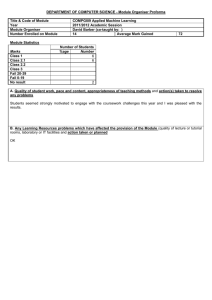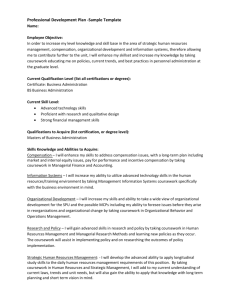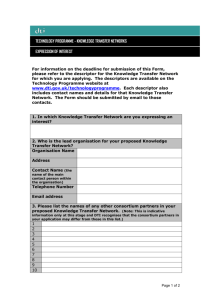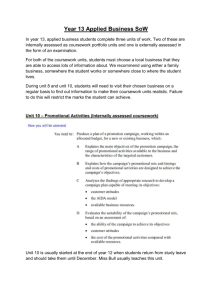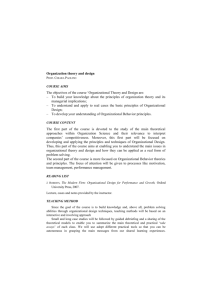Draft Unit Specification 2
advertisement
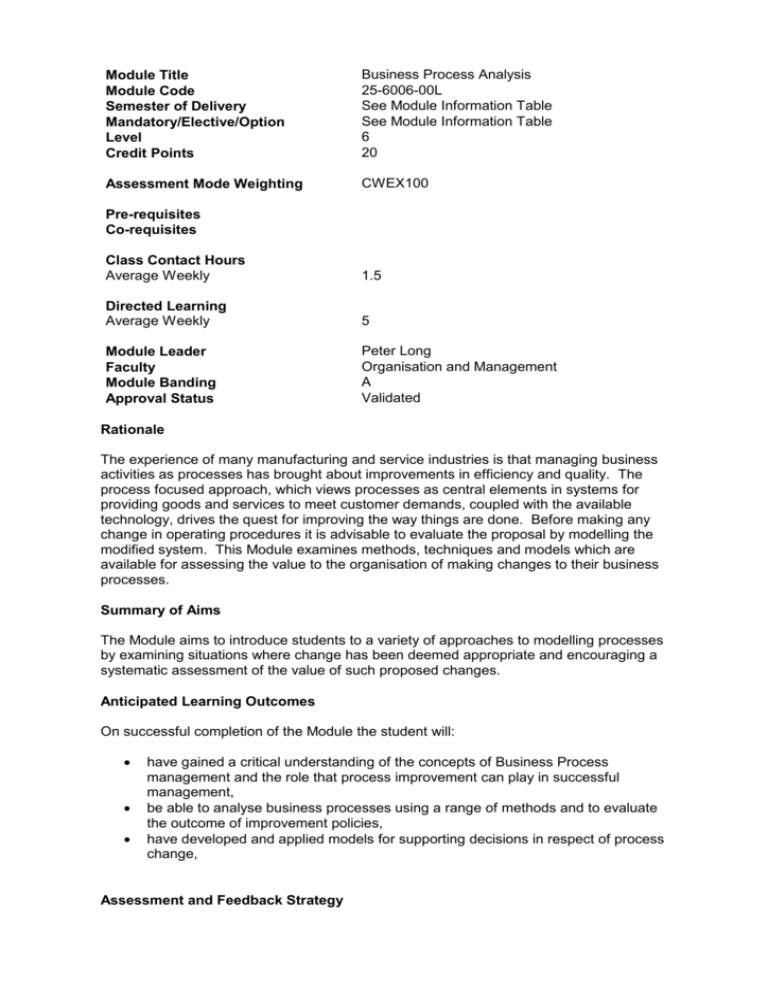
Module Title Module Code Semester of Delivery Mandatory/Elective/Option Level Credit Points Business Process Analysis 25-6006-00L See Module Information Table See Module Information Table 6 20 Assessment Mode Weighting CWEX100 Pre-requisites Co-requisites Class Contact Hours Average Weekly 1.5 Directed Learning Average Weekly 5 Module Leader Faculty Module Banding Approval Status Peter Long Organisation and Management A Validated Rationale The experience of many manufacturing and service industries is that managing business activities as processes has brought about improvements in efficiency and quality. The process focused approach, which views processes as central elements in systems for providing goods and services to meet customer demands, coupled with the available technology, drives the quest for improving the way things are done. Before making any change in operating procedures it is advisable to evaluate the proposal by modelling the modified system. This Module examines methods, techniques and models which are available for assessing the value to the organisation of making changes to their business processes. Summary of Aims The Module aims to introduce students to a variety of approaches to modelling processes by examining situations where change has been deemed appropriate and encouraging a systematic assessment of the value of such proposed changes. Anticipated Learning Outcomes On successful completion of the Module the student will: have gained a critical understanding of the concepts of Business Process management and the role that process improvement can play in successful management, be able to analyse business processes using a range of methods and to evaluate the outcome of improvement policies, have developed and applied models for supporting decisions in respect of process change, Assessment and Feedback Strategy Assessment will be through a piece of individual project-based coursework (50%) and an examination (50%). Coursework will test the clarity of the description of the project situation appraisal of the choice of method application of the chosen methods the validity of conclusions and recommendations for action The examination will assess the criticality of understanding and ability to apply a range of process analysis methods, reflectivity on the role and impact of analysis within an organisation. Students will be given formative feedback during case study and practical sessions. Feedback will also be given on the assessed coursework. Module Assessment Criteria see attached grids Teaching and Learning Strategy and Methods The Module will combine lectures, case study and practical sessions. Indicative Content Business processes in manufacturing and service organisations Business process performance and improvement Analysis of process and customer flow Analysis of capacity management and process and layout design; static and dynamic scheduling Analysis of process variability Learning Materials Hammer M & Champy J (1993), Re-engineering the Organisation, Nicholas Brealey Publishing Harrington H J (1993), Business Process Improvement, McGraw Hill Armistead C and Rowland P (1996), Managing Business Processes - BPR and Beyond, Wiley, Born G (1994), Process Management to Quality Management, Wiley Module Assessment Criteria For the coursework (50%) Learning Outcome Assessment Criterion (where assessed) Level descriptors fail PASS 2.2 2 clarity of the description of the project situation situation unclear and poor description of the managerial challenges satisfactorily clear description of the situation and the managerial challenges situation well described with comprehensive good appreciation of the description of the key managerial challenges issues and background the background and the managerial issues fully described within a clear theoretical framework 2 appraisal of the choice of method little or no consideration of the appropriateness of the chosen methods methods described appropriately some argument for the use of chosen methods appropriate justification and selection of methods methods fully justified on the basis of the challenge and the background 3 application of the chosen methods methods applied inappropriately adequate range of methods and satisfactory application. good range of methods reasonably well applied methods significantly accurately applied all methods applied accurately and competently 3 the validity of conclusions and recommendations for action conclusions invalid or unclear, recommendations poorly linked to the analysis conclusions are largely valid, some recommendations for action recommendations emerge logically from the analysis and are well argued clear development from the analysis with clear recommendations strong argument for the recommended actions based on valid conclusions from the analysis 2.1 First For the examination (50%) Learning Outcome Assessment Criterion (where assessed) Level descriptors fail PASS 2.2 2.1 First 1 criticality of understanding and ability to apply a range of process analysis methods, little or no evidence of understanding the basis for choice or application rationale is articulated, methods are generally correctly applied good argument for choice and application is relevant theoretical frameworks are used in appraising the choice and application of suitable methods. choice is critically appraised against relevant theoretical frameworks and methods are correctly applied 5 reflectivity on the role and impact of analysis within an organisation. little or no consideration of the wider issues or reference to theory or practical examples wider issues are taken into account to a limited extent wider issues are taken into account to a satisfactory extent relevant reference to theory and practice in evaluating the outcomes outcome of application is comprehensively evaluated against theoretical frameworks and practical examples
